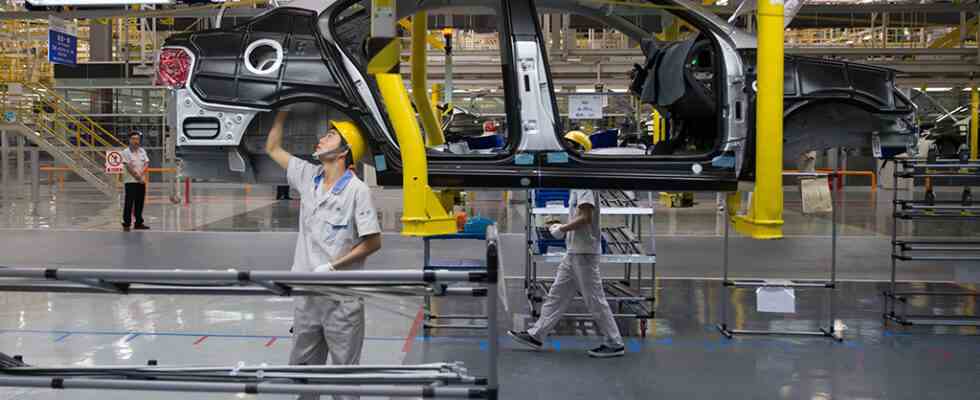Status: 11/28/2022 2:36 p.m
The strict corona policy in China also has consequences for some German companies. In addition to delays in the supply chains, production facilities are also affected – for example at Volkswagen.
Numerous people in China are currently demonstrating against the government’s strict corona policy. They are calling for an end to the tough lockdowns, which are also hitting the country’s economy hard. After repeated unrest and production restrictions in recent weeks, for example in Apple’s largest iPhone factory in the world, Volkswagen is now also affected by the restrictions.
The German automaker has stopped production lines at one plant and is producing less elsewhere. “Production at the Chengdu plant has been temporarily stopped in connection with the current corona wave,” a spokesman said today when asked by the Reuters news agency. He later specified that the production lines at the factory in southwest China, which he runs jointly with FAW, had been stopped a week ago.
Short-term changes “not excluded”
In Changchun in the north-east, the production of two of a total of five production lines is also affected by a lack of parts, the VW spokesman continued. The other lines are currently sufficiently supplied. In the other plants, production is largely stable. “Due to the volatility of the situation, however, short-term changes in the operation of individual production facilities cannot be ruled out,” he added.
At BMW, on the other hand, the Chinese plants recently ran normally. CEO Oliver Zipse said on Friday that only offices were closed because employees were working from home. Mercedes-Benz initially did not respond to a request as to whether production in China was affected.
The zero Covid strategy in China is having a massive impact on the economy in the People’s Republic. Experts from the Japanese financial group Nomura estimated that just over a fifth of Chinese economic output was affected by the lockdown – twice as much as in October. The analysis house lowered its forecast for growth in gross domestic product (GDP) in the fourth quarter from 2.8 to 2.4 percent year-on-year. For the first time in almost two and a half years, both exports and imports fell in October.
“Catastrophic situation” also for European companies
Apple and its supplier Foxconn in particular have been the focus of attention for weeks. The factory in the city of Zhengzhou, where around half of all iPhones worldwide are produced, has been working with significantly reduced capacity for some time. After a corona outbreak, the authorities imposed a lockdown in the area around the plant at the beginning of November. Thousands of employees then fled for fear of corona infection or the strict measures, and violent protests broke out.
Foxconn then offered employees higher wages if they decided to return despite the restrictions. The plant continued to run in a so-called “closed circuit”: Employees were not allowed to leave the factory premises. Now a lockdown has even been decided throughout the city. This is delaying shipments of new iPhones around the world.
European companies are now also sounding the alarm. The situation is “catastrophic,” said the President of the EU Chamber of Commerce in Beijing, Jörg Wuttke, on Friday. While the world is opening up and returning to “business as usual”, China is again in an uncertain situation. According to Francis Liekens, representative of the EU Chamber of Commerce in Shanghai, many companies have therefore postponed business trips and prepared for the upcoming closures of the production facilities.
“Serious Effects in Production”
In the German economy, the increase in the number of infections and the lockdowns imposed in China are also causing concern. “China’s adherence to the zero-Covid policy in combination with the excessive lockdowns, even in the case of isolated cases of illness, make the business relations with the Middle Kingdom, which are so important for German trade, more difficult,” said Foreign Trade President Dirk Jandura of the Reuters news agency.
For bilateral trade relations and also for world trade, this brings renewed uncertainty in the supply chains and weighs on economic development across the board. “We still have bad memories of the traffic jams in front of the Chinese ports at the beginning of the year. The consequences were noticeable for many of our wholesalers and foreign traders well into the year,” says Jandura. Apparently it’s not that far yet.
Although some companies are already preparing for “serious effects in production”, disruptions in the supply chains due to the “soft lockdowns” in Beijing and many other cities in China have not yet had a full impact, said Jens Hildebrandt, executive board member of the German Chamber of Foreign Trade (AHK ) in China, opposite the “Handelsblatt”. Despite delays in the supply chains, nobody in Germany has to worry about empty retail shelves, emphasized the German trade association HDE. The dealers have changed delivery routes and new suppliers.

